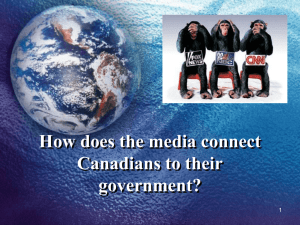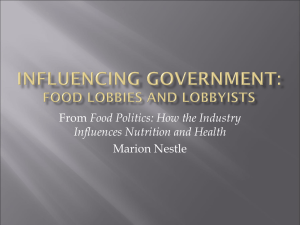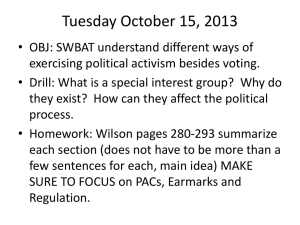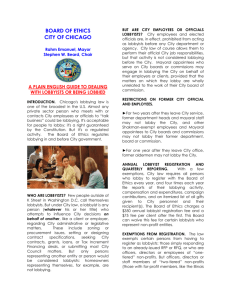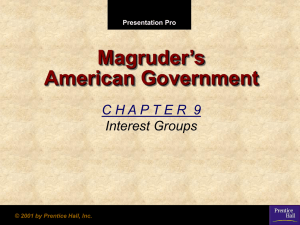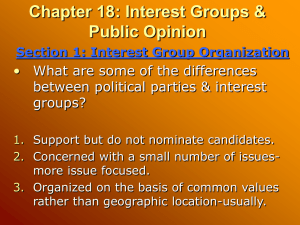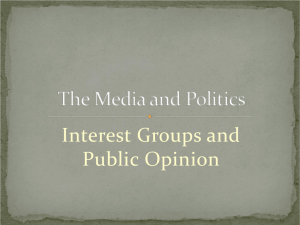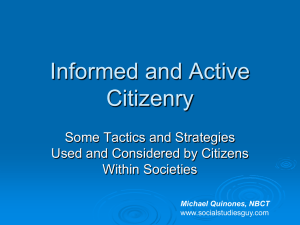What do lobbyists do? - Clover Bar Junior High
advertisement
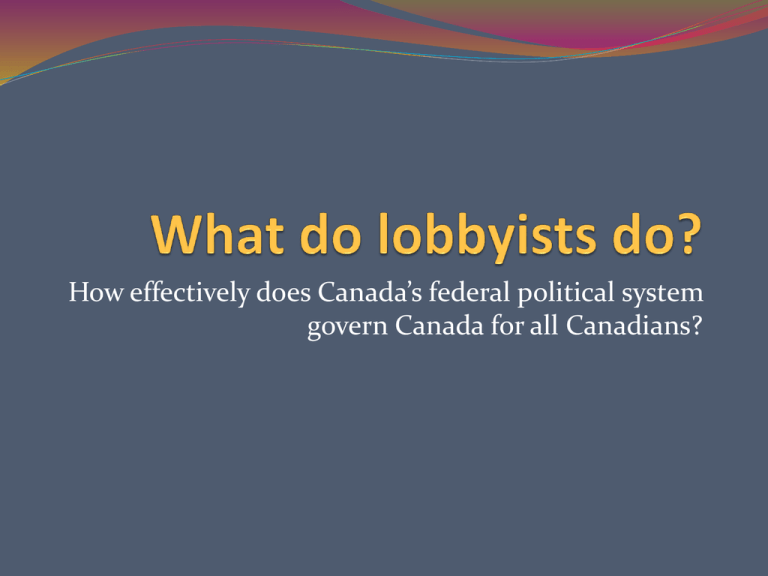
How effectively does Canada’s federal political system govern Canada for all Canadians? Lobbyists This section, you will find out: • What lobbyists do. • The extent to which lobbyists support Canadians in the political scene. • How lobbyists influence the government’s decisions. Who are lobbyists? They are individuals hired by a certain group to influence MPs and put pressure on political officials about specific issues. Lobbyists often use the media to voice their views on issues that affect members, services, and products. Lobbyists Pressure groups often use lobbying to get their message across to decision makers. Lobbying can be described as communicating with one or more political decision makers and trying to influence them to take a favourable position on a proposed or existing policy. The most effective lobbying often is carried on by professional lobbyists whose job it is to approach government to protect the interests of the organizations paying them to lobby. They talk to officials, politicians and sometimes the general public to convince them that their needs and views are important. Lobbying in History In 1842, the Anti-Corn Law League was the most prominent and powerful lobby group of the time. The League pressured the government to overturn legislation that kept the price of grain (called "corn" in England) too high. The League talked to influential politicians, formed community groups, raised money, made speeches, drew cartoons, wrote editorials for newspapers, and organized petitions and demonstrations. They were successful in influencing the government to change the laws. Lobbying in History In the mid 1800s, those who supported the building of a railway also formed a lobby group. Backers of the Canadian Pacific Railway worked to persuade the people about the advantages of the railway. They used arguments that emphasized the dangers of American expansionism and the increased quality of life that new technology would bring. Lobbying in History In 1873, John A. Macdonald's government was defeated when it was revealed that prominent Members of Parliament had accepted money from Sir Hugh Allan in exchange for ensuring that Allan would win the contract to build the railway. What about lobbyists today? Non-Smoker’s Rights Association. http://www.nsra-adnf.ca/cms/ Results? Tougher controls on smoking Warnings placed on cigarettes Smoking banned in public places Other Lobby Groups Let’s look at other lobby groups. What are they advocating the government for? http://www.musiccreators.ca/wp/ http://www.wwf.ca/index.cfm http://www.cfs-fcee.ca/index_fl.html http://rightsofchildren.ca/ http://www.ccdonline.ca/en/ How might lobbyists affect political decision making? Questionable Politics Today lobbying has increased as a business and plays an ever increasingly important role in the political process. Lobbyists can have significant influence in how policies, and therefore laws, are determined. Critics of lobbying claim that there are serious ethical concerns raised by the practice. Lobbyists are seen as participating in "backroom politics" where important government decisions are made away from the public eye. Questionable Politics Lobbyists can also threaten the ethical decision- making of government by influencing politicians’ decisions through private incentives and agreements with politicians in the form of "if you scratch my back, I’ll scratch yours." In 1989, the government passed the Lobbyists Registration Act. This act included rights, responsibilities and rules for lobbyists, including providing information on themselves and on the subjects for which they were lobbying. Current Events How much do you think lobbyists contribute to our provincial government? Let’s look at an article from the Edmonton Journal about lobbyists and the Conservative government in 2010. How do lobbyists see themselves? Read the quotes on pages 52 and 53. 1. Answer the CTC on page 52. 2. Complete the first three questions in #1 on page 53. Show insight and thought into your point of view! Did you think of… Pg 52: Lobbyists represent specific sectors of our population, but there is no guarantee that all groups will be represented. Only those who are well organized and well funded will have lobbyists. Lobbyists can help gov’t decision making by providing expertise that the MPs do not have. They can hinder decisions by influencing politicians to favour solutions that might not be in the best interests of all Canadians. Lobbyists often suggest that, if cooperative, the government will get some major benefit, such as increased tax revenue or job creation. Did you think of… Pg 53: The lobbyist for CAPP believes that he represents Canadians who work in the petroleum industry and who have the technical expertise to address the issues. The lobbyist from the Pembina institute believes he represents Canadians who are concerned about the environment. They agree that working together with different perspectives and with the gov’t, is the best way to develop good solutions to the issues. They sometimes disagree on solutions, for example, that more controls are necessary. Think critically We have discovered: The structure of our federal government How laws become laws How the media is used to connect us to the our government How lobbyists influence decisions. Based on your knowledge, how effectively do you think our political system governs our country for ALL Canadians? Think critically Let’s do a poll to find out what your classmates think: How effectively does Canada’s federal political system govern Canada for all Canadians? Be prepared to explain your answer! http://www.polleverywhere.com/multiple_choice_polls /LTM3NzQ2MzQyNQ
